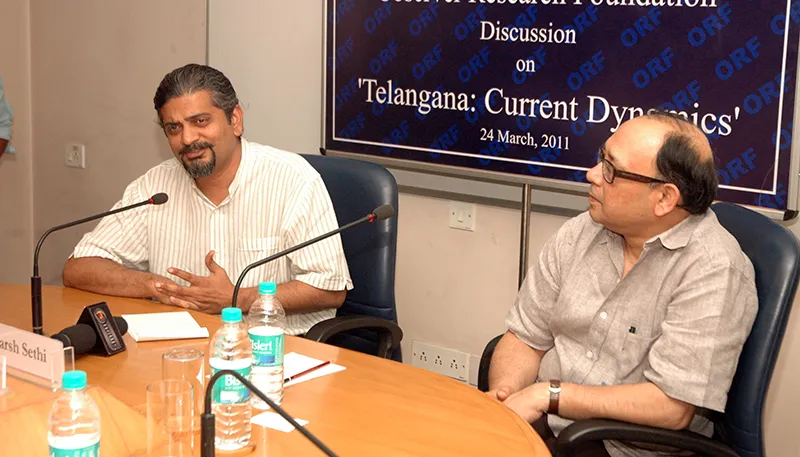-
CENTRES
Progammes & Centres
Location
Andhra Pradesh is in a state of huge flux today. Apart from challenges like Naxalism, the Telangana issue has intensified the turbulent political atmosphere. The recent submission of Justice B N Srikrishna Committee Report has brought back the question of reorganisation of Andhra Pradesh onto national headlines.

Andhra Pradesh is in a state of huge flux today. Apart from challenges like Naxalism, the Telangana issue has intensified the turbulent political atmosphere. The recent submission of Justice B N Srikrishna Committee Report has brought back the question of reorganisation of Andhra Pradesh onto national headlines. Only a close analysis of the historic and political framework of the State can provide insights to the demand for division and its implications. In this context, a discussion on 'Telangana Issue and Political Scene in Andhra Pradesh' was organised by the Chennai Chapter of Observer Research Foundation on Saturday, 29 January 2011.
Mr. N. Sathiya Moorthy, Director, Observer Research Foundation, Chennai Chapter, initiated the discussion with a critical analysis of the Sri Krishna Committee Report. He observed that the six options listed by the committee in essence provide the choice between a divided Andhra Pradesh and a unified Sate with altered power equations. Though most of the suggestions have been prevalent prior to the report, the committee performed its task with due diligence, Mr.Moorthy remarked. He also appreciated the efforts taken by the Centre in convening an all-party meeting immediately after the submission of the report.
The political intricacies of the Telangana issue, both at domestic and national-level, was explained by Mr. Sathiya Moorthy. He was of the opinion that the decision on Telangana would have far-reaching implications, ranging from the revival of similar demands in other parts of India to the stability of the Central Government. Mr. Moorthy presented a comprehensive analysis of the various players, including the Naxalites, in the Telangana issue and brought out the delicate yet highly complex political calculations associated with it.
Chairing the session, Col J Francis (Retd) observed that the root cause for majority of the demands for separate States flowed from the tussle between the concepts of prosperity and power. Though the existing problems faced by a region cannot be fully resolved by redrawing the boundaries, smaller geographic units may prove to be more convenient for drafting developmental strategies, said Col. Francis. He also pointed out the need to draw parallels and learn lessons from the Andhra experience. During the interaction that followed, participants discussed several significant issues.
• The demand for a separate State of Telangana has historic roots as the merger of the region with Andhra Pradesh was temporary in nature and the plan was open for future deliberations.
• The trigger behind the resurfacing of Telangana issue might be politically motivated or it can also be a political expression of the genuine grievances of the people owing to the historic neglect and underdevelopment of the region.
• The cyclic nature of the Telangana movement would largely depend on the stakeholders involved in the entire issue. The movement might be carried on further if the naxalites take up the cause, or it can eventually undergo a political negotiation if it remains within the ambit of political parties.
• The economic viability of the proposed state of Telangana is not much of a concern as long as the assistance and support from the central government is ensured. The questions of stability and longevity of the newly emerging structures could be answered only in the context of the constantly evolving political dynamics.
• The riparian issue has to be addressed adequately and the irrigational facilities have to be developed evenly across the three sub-regions of Andhra Pradesh. The variations in the fertility of the land have to be compensated with additional input for agricultural and industrial development.
• The level of popular support to the Telangana movement has to be carefully analysed and solutions must be provided for the developmental issues of the common man.
• The question of Telangana needs to be evaluated against the entire canvas of the nation. The far reaching implications of the demands for reorganising states have to be taken into consideration, before drawing final conclusions in the Telengana issue.
• The idea of appeasing the demands for separate States through fragmentation requires a close scrutiny. A comparative study of the success rate of previous cases of state reorganisation must be done before such initiatives are carried out.
• More than the nature of the political system, efficiency of the delivery mechanism would be decisive in providing solutions to the various developmental challenges of any state and Andhra Pradesh in particular, with respect to attaining parity among the different regions within it.
• Efficient leadership, effective communication and timely adaptation to the changing needs of time would enable India to face the internal challenges adequately. The demands for reorganisation of states need to be addressed as a political and developmental issue rather than a law and order problem. (This report is prepared by Neethu S Thottammariyil, II MA (International Relations), Stella Maris College, Chennai)
The views expressed above belong to the author(s). ORF research and analyses now available on Telegram! Click here to access our curated content — blogs, longforms and interviews.